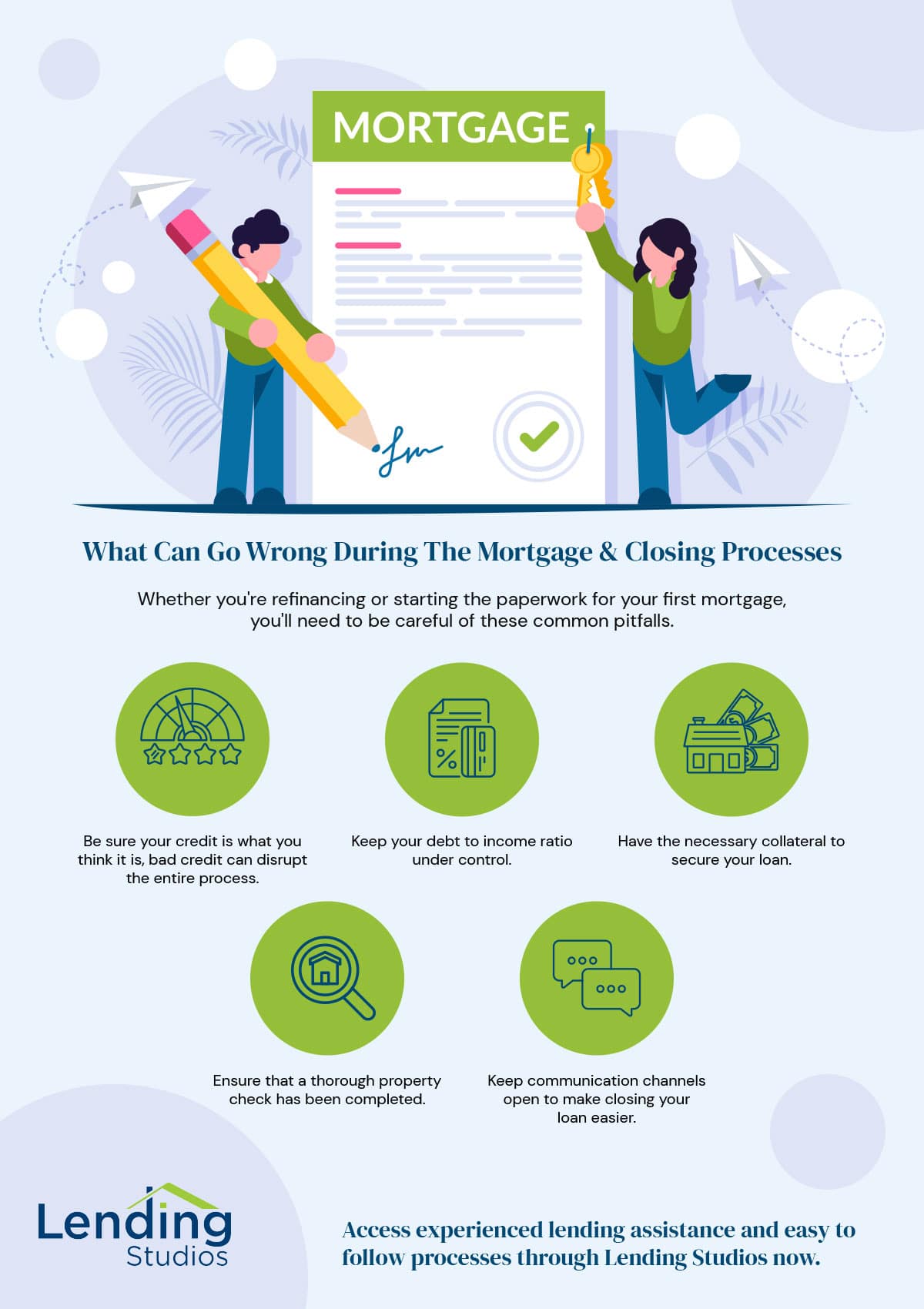Are you ready for the home buying process? It’s a lengthy one and can be quite a ride, so be prepared to hold on tight. Things can go right, but when they go wrong it can delay you turning the key and walking in the door to your new home. What can go wrong during mortgage and closing? We’ll help walk you through the steps.
The process of buying a home
First, you have the searching process. You’ve got a list of things you’re looking for in a home. Sometimes, it can seem like you are looking forever before you finally find anything that comes close to what you desire to live in. Flash forward, you finally have found the home of your dreams afters months and months of endless Google searches and tours with your real estate agent.
You found the home you love in the neighborhood you’ve been eyeing. The one that checks all of your boxes: open concept, large master bath, two-car garage, hardwood floors and more. You’re in love! So, is that the end of the process? Unfortunately, you’re just now getting started. Now the real not-so-fun part begins: the paperwork process.
The next steps include finding a lender, gathering all needed information and documents, and beginning the underwriting process. Buying a home is a large undertaking, and unfortunately it’s not all smooth-sailing. Sometimes, there are bumps in the road. When it comes to real estate financing, there are usually two points at which things could fall through in: either the borrower’s financing or the property check. So, what can go wrong during mortgage and closing? We’re here to prepare you so you’re not caught off guard.
The 3 Cs that can go wrong during mortgage and closing
Mortgage underwriting is when you submit your application for a mortgage and an underwriter reviews. Essentially, this is when they’ll decide if they think you’ll be able to afford and pay back your mortgage or not. Underwriters are looking for the 3 Cs according to Freddie Mac:
- Credit Reputation: this is where they look at credit scores, bankruptcy/foreclosures, mortgage delinquencies, credit accounts, and the borrower’s request for new credit in the last year. Is the borrower’s credit in good standing? Do they have any marks on their credit that are a point for concern? This is where the underwriter will dig deeper into your credit history to answer those questions.
- Capacity: here they consider debt radios and how much money you make. They’ll look at qualifying monthly housing expense-to-income ratio or monthly debt payment-to-income ratio. Are you self-employed or salaried? All of this along with the characteristics of the loan you’re seeking play into the capacity category. The lender wants to see that you have a stable income and not a lot of debt. This ensures the lender that you won’t have too much boggling you down. They want to be sure you can afford your mortgage.
- Collateral: what are you putting on the line for the loan? Here they’ll look at your total equity/down payment, property type, and what the use of the property will be for. Collateral is essentially an additional form of security for the lender. If you can’t pay your payments, collateral assures the lender that they’ll be okay if you default on your loan.

What else can go wrong during mortgage and closing?
How can these go wrong? Unfortunately, there are a number of ways you closing on the home of your dreams can be delayed. For example, sometimes before you buy the home you provide the seller with a pre-approval letter. This indicates that you, the borrower, has been pre-approved for a mortgage loan. However, this doesn’t guarantee the buyer will secure the loan. The lender could see something within the 3 Cs that prove to them you’re too risky of a borrower. This can happen because you weren’t properly qualified or approved. A mortgage isn’t guaranteed until you sign all the paperwork. The bank won’t hand over the money if something comes up during the underwriting process that would cause them to deny you a loan.
Closing a loan is the last hoop to jump through before you can officially purchase the home. Along with making sure you’re approved for your loan, sometimes the process can be stalled by the seller and property. This is the tricky part. You can’t solely make sure your process isn’t delayed. You’re relying on several other parties to help get you in the door of your dream home, which means human error can happen and delay your closing.
Property & seller delays
With the property, it’s smart to request a home inspection and require it in your contract with the seller. Sometimes even the mortgage lender will require one. The seller should disclose anything negative about their home, but this way you know for sure what you’re getting into. Another smart tip is to do a final walk-through, where you visit the home with your real-estate agent and see if you notice any new problems. In the event that new problems arise, you’ll have to come up with a plan to deal it before you can close.
More delays can include the appraisal being too low. A bank will confirm whether the home is worth the estimated value. If the appraisal comes back lower than what the estimate originally indicated, the next steps include seeking a second opinion or negotiating a reduced purchase with the seller. Nonetheless, both of these options will more than likely delay closing.
If there’s an issue with the title, this can also cause an unwanted delay. A title delay can happen if a search shows a lien on the property. It can also happen if the seller is not the current property owner.
Other delays that could arise from the sellers end could be that they’re in the process themselves of getting into a new home and might be delayed on their side of things. In this case, it’s not uncommon for them to request you move your closing timeline, especially if they’re closing date has been changed and their move-out date has been affected. It’s all apart of the process and it’s common to have to do. The difficult part here happens when you have scheduled movers and more to help you on your big day.
When it comes to getting ready to close, practicing patience will help you get through the process smoothly. Investopedia sites that while there are many different parties involved in closing escrow, just one problem is enough to have your closing delayed for longer than you were hoping.
Avoid delays
What else can go wrong during mortgage and closing? Delays. To avoid closing delays the best you can, we recommend following these tips:
- Take care of more underwriting up front before you get ready to buy a home
- Once you’ve found the home you want, apply for a mortgage
- Know your neighborhood’s worth to spot any red flags of appraisal problems
When closing, it’s multiple parties working together for long periods of time. Your closing officer, lender, and real estate agents have to work together to ensure everything goes off without a hitch. However, even though they’re skilled in the home buying process, they’re also human and sometimes make mistakes which can delay you getting into your new home. Buying a home can be stressful because of the tight timeline and how many things have to happen within that period. There are a lot of high-risk decisions being made during the process of purchasing a home, and oftentimes it is uncharted territory for the buyer. By taking the time to learn about the process and what potential delays there are, you’ll know what could come up when buying a home.




